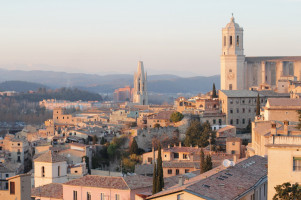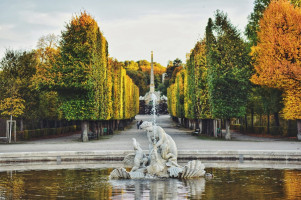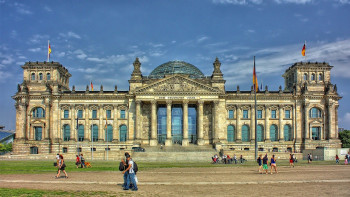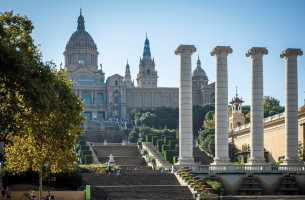Girona Travel Guide
Girona, located in Catalonia, Spain, is a city steeped in history and charm. Its well-preserved medieval architecture, including the impressive Girona Cathedral and ancient city walls, showcases its rich cultural heritage. The city's picturesque setting along the Onyar River and vibrant culinary scene make it a popular destination for travelers. Girona is also famous for its annual Temps de Flors festival, where the city bursts into color with floral displays.Top Attractions in Girona
- Girona Cathedral
- The Jewish Quarter
- Arab Baths
- Onyar River Houses
- City Walls Walk
Girona is Famous for
Its well-preserved medieval architecture and annual Temps de Flors festival.Top Attractions in Girona
Girona offers visitors a range of attractions and experiences to enjoy:- Exploring the historic Girona Cathedral
- Strolling through the charming Jewish Quarter
- Relaxing in the ancient Arab Baths
- Admiring the colorful Onyar River Houses
- Walking along the impressive City Walls
What's Great about Travelling to Girona?
Travelers should choose Girona for:- Its rich history and culture
- Scenic views along the Onyar River
- Delicious Catalan cuisine
What's Not So Great about Travelling to Girona?
Girona may not be suitable for:- Travelers seeking a bustling nightlife scene
- Those looking for a beach destination
Travel Tips for Girona
- Visa Requirements: Check visa requirements before traveling.
- Transportation Options: Use public buses or trains to get around the city.
- Safety Tips: Be cautious of pickpockets in crowded areas.
Important Girona trip information
- Ideal Duration: Spend at least 2-3 days exploring Girona.
- Best Time to Visit: Spring and fall offer pleasant weather for sightseeing.
- Nearby Airports and Railway Stations: Girona-Costa Brava Airport and Girona Railway Station are convenient transport hubs.
Per Person
1,06,899
*EXCLUDING APPLICABLE TAXES 4.9 Ratings
( 200 Reviews )
( 200 Reviews )
Per Person
1,52,869
*EXCLUDING APPLICABLE TAXES 4.9 Ratings
( 200 Reviews )
( 200 Reviews )
Per Person
2,39,804
*EXCLUDING APPLICABLE TAXES 4.9 Ratings
( 200 Reviews )
( 200 Reviews )
Per Person
1,99,643
*EXCLUDING APPLICABLE TAXES 4.9 Ratings
( 200 Reviews )
( 200 Reviews )
Per Person
2,61,444
*EXCLUDING APPLICABLE TAXES 4.9 Ratings
( 200 Reviews )
( 200 Reviews )
Per Person
1,47,902
*EXCLUDING APPLICABLE TAXES 4.9 Ratings
( 200 Reviews )
( 200 Reviews )
FAQ's on Girona
Q1: What is the best time to visit Girona?
The best time to visit Girona is during the spring (April to June) and fall (September to November) when the weather is mild, and the city is less crowded. These months offer comfortable temperatures for exploring the city's attractions and enjoying outdoor activities. Summer (July and August) can be hot and busy with tourists, while winter (December to February) brings cooler temperatures and fewer crowds but may limit some outdoor experiences due to the weather.
Q2: Do I need a visa to travel to Girona?
Most visitors to Girona, as part of Spain's Schengen Zone, do not need a visa for short stays. Travelers from EU countries, the US, Canada, Australia, and many other countries can enter Girona visa-free for up to 90 days within a 180-day period. However, it's essential to check the specific visa requirements based on your nationality before traveling.
Q3: What are the must-visit attractions in Girona?
Girona offers a wealth of attractions, including the stunning Girona Cathedral, the well-preserved medieval Jewish Quarter, the colorful houses along the Onyar River, and the iconic City Walls. Don't miss the Arab Baths, Sant Pere de Galligants, and the impressive Game of Thrones filming locations that have put Girona on the map for many travelers.
Q4: Is Girona a safe place to travel?
Girona is generally a safe city for travelers. Like any destination, it's essential to be cautious of pickpocketing in crowded areas and to stay vigilant, especially at night. Avoid poorly lit or deserted areas and take standard safety precautions. The city is well-policed, and emergency services are readily available.
Q5: What is the local currency in Girona and can I use credit cards?
The local currency in Girona, as in the rest of Spain, is the Euro (€). Credit cards are widely accepted in hotels, restaurants, and shops in Girona. ATMs are also plentiful, making it easy to withdraw cash if needed. It's advisable to inform your bank of your travel plans to avoid any issues with card transactions.
Q6: What is the local cuisine like in Girona?
Girona boasts a rich culinary scene with influences from Catalan cuisine. Try local specialties like "mar i muntanya" (surf and turf dishes), "crema catalana" (Catalan version of crème brûlée), and "coca" (a type of savory pastry). Seafood, cured meats, and fresh produce feature prominently in Girona's gastronomy. Dietary considerations can be accommodated in most restaurants.
Q7: What transportation options are available in Girona?
Girona has a well-connected transportation network, including buses, trains, and taxis. The city is compact and walkable, making it easy to explore on foot. Public buses and trains provide access to nearby towns and attractions. Car rental services are also available for those wanting to venture further afield or explore the countryside.
Q8: Are there any cultural norms or etiquette I should be aware of when visiting Girona?
When visiting Girona, it's essential to respect local customs and traditions. Greeting people with a handshake or kiss on the cheek is common. Dress modestly when visiting religious sites, and avoid loud behavior in public places. Tipping is appreciated but not obligatory, and it's customary to round up the bill in restaurants. Embracing the siesta culture, where shops may close in the afternoon, is also part of the local way of life.
Q9: I am a travel agent. How can I buy travel leads of Girona?
Register yourself as a travel agent at agents.tripclap.com and then you can buy travel leads to Girona once your account is approved. For more details contact our support team at +91-8069186564 or support@tripclap.com






